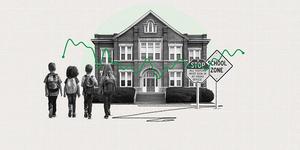Education and Families
Explore Gallup's research.

Teachers with meaningful growth opportunities report higher job satisfaction and lower burnout.

Roughly four in 10 parents have feared for their child's safety at school each of the past four years, the longest such stretch in Gallup's trend since 1998.

U.S. adults see math skills as important but value them more for personal life than work. Older Americans are more likely to say math skills are important.

Managers anticipate increased hiring of workers with data science skills in the next five years, while almost four in 10 wish current direct reports had more data science skills.

Most Americans regard respect, family, trustworthiness, freedom and kindness as important values, but family stands out when asked to pick their top three.

Six in 10 teachers use AI tools for their work, and three in 10 are using it at least weekly, saving an estimated 5.9 hours per week.

Students want to learn, but how they learn matters. Active learning, student agency, and real-world skills fuel deeper engagement and future readiness.

Student engagement in learning is low among Iowa students but can be combated by promoting differentiated learning and student agency.

A majority of Americans find math challenging, while nearly half say it is interesting. Positive emotions about math vary widely by age and gender.

Most education leaders say it is challenging to hire well-qualified math teachers, with leaders serving lower-income areas especially likely to say so.

While 52% of K-12 parents receive regular communication about what their child is learning in math, substantial percentages report getting little to none.

Many education leaders are unfamiliar with High-Quality Instructional Materials, and most schools and districts lack an official definition of the term.

Gallup studies perspectives on K-12 math education to understand barriers, perceptions and the role of math at school and beyond.

Nine in 10 U.S. K-12 superintendents regard summer learning programs as important. Most say their district will maintain or increase program funding.

K-12 parents are more likely to report negative social or emotional pandemic-related effects on children than academic or physical health problems.

Rural Gen Zers see fewer opportunities in their area for good jobs and college degrees. Perceived job opportunities influence Gen Zers' desire to relocate.

Most Black parents with young children report engaging in activities that bring their family together, such as music and dance and sharing meals and traditions.

In the Voices of Gen Z study, 10- to 18-year-olds and their parents share what they wish others understood about being a Gen Z child or their parent.

Explore Gen Z's perceptions of their lives, school and their outlook for the future.

See how countries measure up on two key indicators of youth development: whether children are treated with respect and have opportunities to grow.